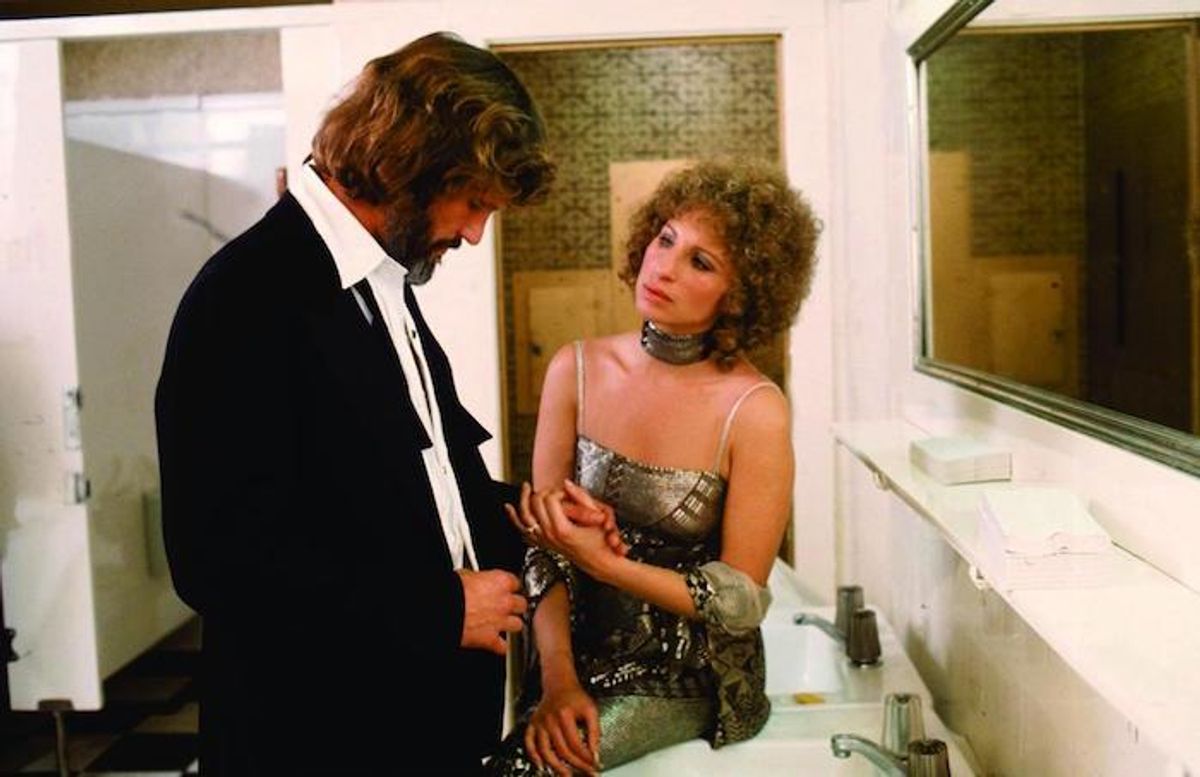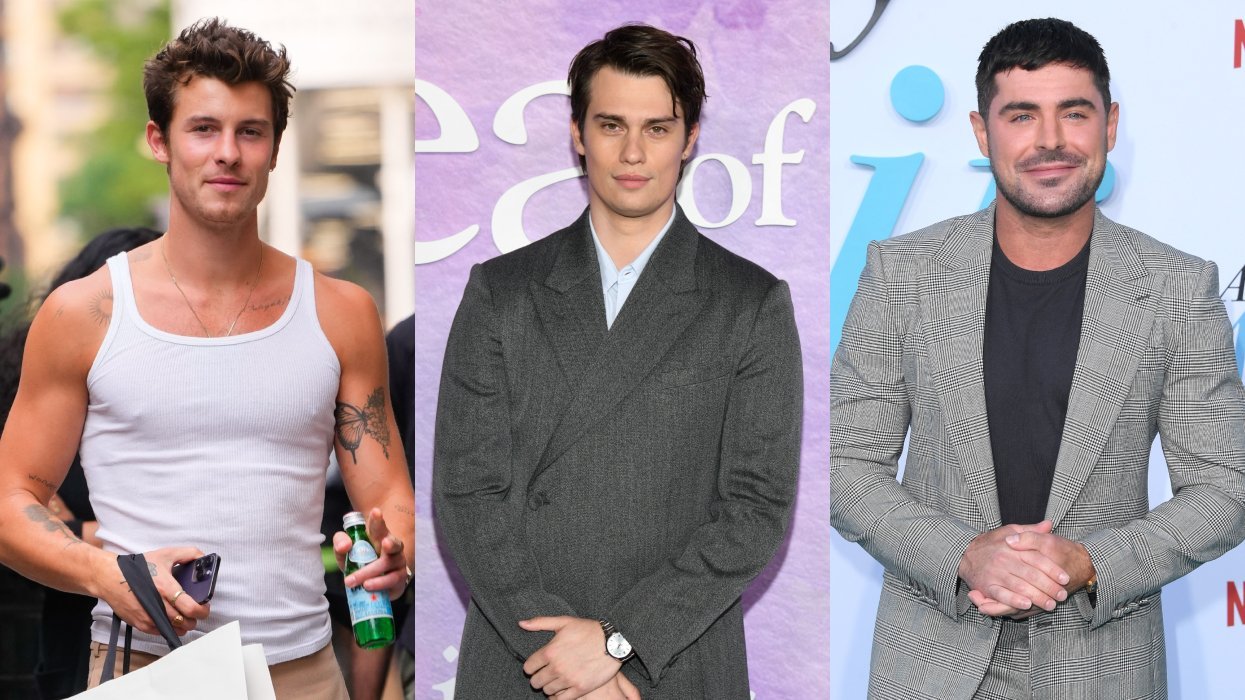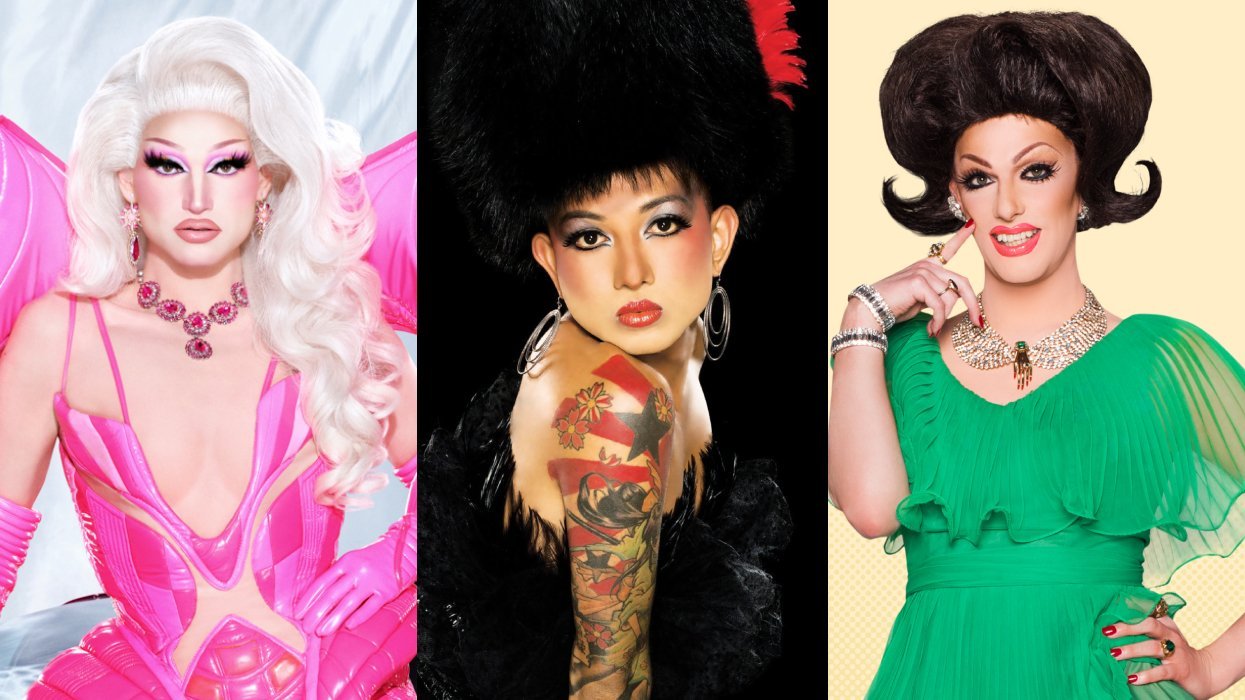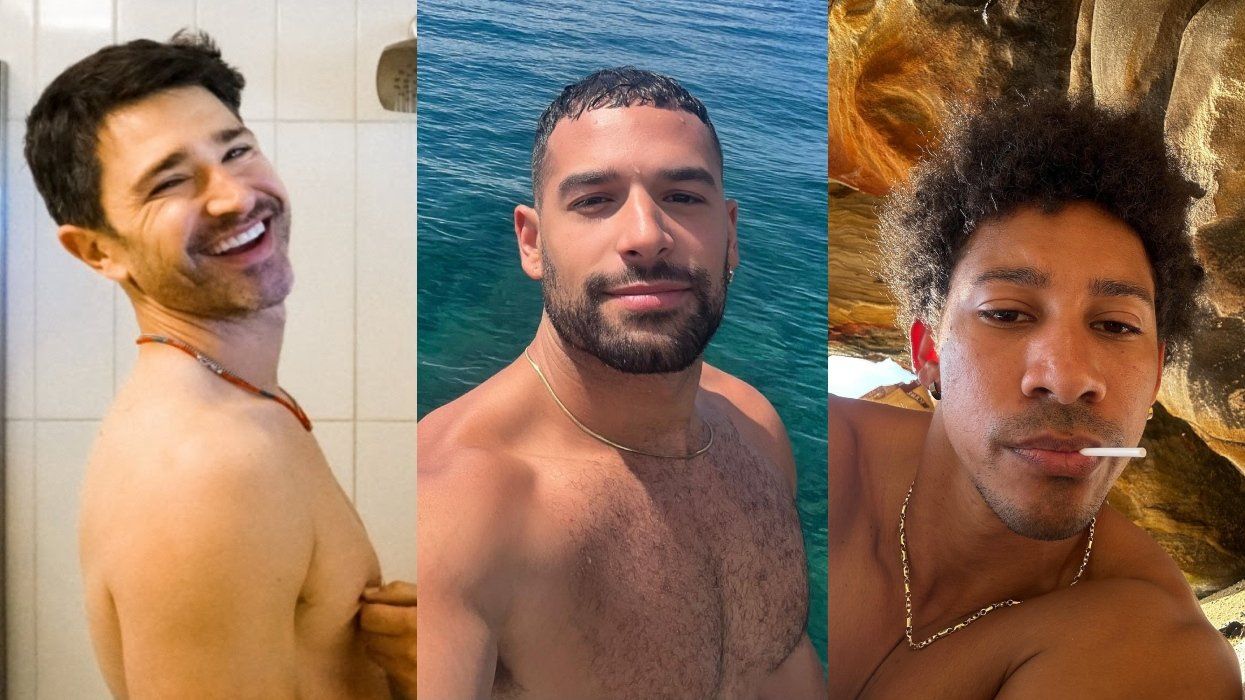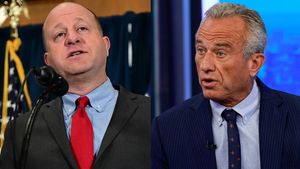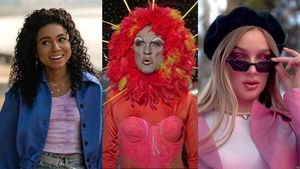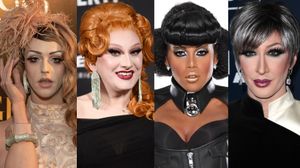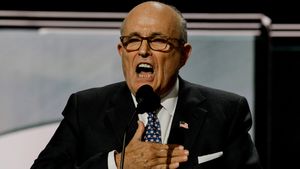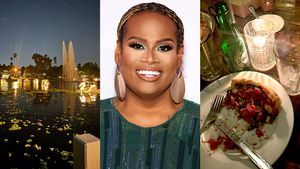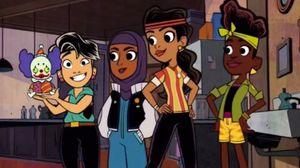After seeing Bette Midler in Hello, Dolly! and then spending this past weekend in the rapture of Barbra Streisand and Diana Ross, I was hoarse from cheering, but stopped to think, "Where's Liza? That would complete my Mount Rushmore of old-school gay icons." I've already raved about Bette's diva turn, which is well worth mortgaging your first born to witness. Let me tell you about the other two ladies who just made me gay again.
AGELESS AND EVERGREEN
Director Robert Rodriguez gushed out of control about his interview subject Barbra Streisand at their Tribeca Film Festival "Tribeca Talk: Storytellers" event on Saturday, but he was cute about it, and no one was arguing anyway. Dressed in solid black, Barbra was sleek and assured, offering some fascinating peeks into her ambitions and achievements. She said she was an unhappy child who desperately wanted to escape reality, so she went to movies because "I loved the make believe world." Barbra had a talent for singing--"My ID was, 'No father, good voice,'" and at age nine, she brazenly thought, "I'm gonna be a star," and willed herself to it, though she didn't achieve her original dream of wanting to act in Ibsen, Chekhov and Shakespeare plays. The will is still with her ("People ask, 'How do you hold the notes so long?' Because I want to"), but she admitted that the flip side of confidence is having some serious self doubts. (Barbra said, "I only remember the bad reviews." In fact, during the talk, she took the New York Times' Janet Maslin to task for criticizing Yentl's lighting and designer Yarmulkes back in 1983, but neglecting to note that the film is a celebration of what women can do).
Also about her film career: Babs loved working with director William Wyler on Funny Girl, though she claimed the press painted things differently. ("I always had opinions, and opinions in the sixties were not popular for women." Rodriguez chimed in that on the last day of shooting, Wyler gave Barbra a golden megaphone that said, "Congratulations on directing your first movie.") She enjoyed working with Sydney Pollack, but when he cut two key scenes from 1973's The Way We Were, she decided to direct films herself. That was confirmed with 1976's show biz marital musical A Star is Born (which Lady Gaga is remaking). "I was in a sense blackmailed into having the director," said Barbra, meaning Frank Pierson, who wrote the script, but said he would only do a rewrite if he could direct. But she did get her way in wanting to sing live in the film, admitting, "I'm a terrible lipsynch, and I can't be in the moment if I'm trying to do something I did three months before." Fortunately, there are plenty of drag queens who can lipsynch Barbra just fine.
With The Prince of Tides, the studio wanted Barbra to sing a song over the closing credits, to get another Oscar nomination for the film. "But you'd think, "Why is this psychiatrist singing?" she laughed, adding that Robert Redford didn't want her singing at the end of The Way We Were. Her singing idol was Johnny Mathis, who was good looking and soulful--"and I'm always drawn to pain." And as for her current projects, she gardens; her son, Jason Gould, has a Quincy Jones-produced album coming out; and Barbra wanted to play divine actress Sarah Bernhardt, who she said played Hamlet in her seventies. As for Streisand doing Gypsy at 75? There was no mention of it at all, so it sounds like it's dead in the gay sparkling water. But not this brassy icon, who keeps making her fans feel like the luckiest people in the world. She even got cutely political at one point. When Rodriguez said something about knocking down career walls, Barbra interjected, "Don't mention a wall to me!" and the crowd went wild.
COME SEE ABOUT HER
At City Center on Friday night (after having already done several nights there), the dizzying Diana Ross sparkled, providing a lovefest consisting of wondrous oldies and fabulous fashions. She entered in a glittery green gown topped by a green chiffon cape, singing "I'm Coming Out" to thunderous applause from a lot of people who could certainly identify. The Motown legend looked great, smiled infectiously, and definitely wasn't phoning it in. Rather than toss off a quickie melody of Supremes hits, she did entire versions of many of them--like "Baby Love," "Come See About Me," and "You Can't Hurry Love"--delivering each one with such loving care, you felt it was her first time performing them. Singing the haunting "My World Is Empty Without You," she was backed by slides of late, lamented music legends who've left a void. Joking "This is my life story," Diana went into a captivating "Love Child" ("Scorned by society... Different from the rest") and during an instrumental riff at the end of the song, she went offstage, then re-emerged in a red sparkly gown and furry jacket, singing a rollicking "The Boss," by now having reminded us that at 73, that's exactly what she is. This led to winning versions of "Touch Me In the Morning," "Upside Down," "Love Hangover," and "Ease on Down The Road" (from The Wiz), as I realized that Diana was determined to serve a full platter of career highlights, making for a hearty meal of glittery nostalgia. After another change--into something that was very Big Bird by way of Liberace--she delivered a stunning version of Billie Holiday's "Don't Explain" (which Miss Ross performed in her Oscar-nominated Lady Sings The Blues). It was unfettered and direct and brilliant and breathtaking--the high point of the evening. And I was thrilled to know there was even more to come. I turned to my friend and said, "She'd better do Mahogany," and sure enough, after yet another fashion switcheroo, Diana gave us that kitschily appealing theme song. And she really had the audience going with "I Will Survive," encoring with her trademark crowd connecter, "Reach Out and Touch (Somebody's Hand)" as arms waved and we swayed as one. As the band played some more "Survive" riffs, daughter Rhonda Ross Kendrick came up to sing a few bars and then they all exited, with Diana professing love for each and every one of us. I wish they'd have played her off with one of her own songs--maybe "Someday We'll Be Together" or "Remember Me"--and I also wish the concert had gone on for 100 more hours, so I could hear "In and Out of Love," "The Composer" and so many others of my faves--but that wouldn't be realistic, and to paraphrase the Billie Holliday ditty: "Don't complain." Diana gave 100 percent, and the result reminded us of the power of showmanship, star quality and live singing.
THREE GIRLS AND A GUY
After its 2016 opening was aborted, About Ray was re-edited and has transitioned into a film now called 3 Generations. In the Gaby Dellal-directed movie, a musically oriented, self possessed teen named Ramona is now Ray, and facing all kinds of challenges. Feeling as if his female body parts are a trick nature played on him, Ray wants to live as a male, change schools and be "normal." But he's confronted by grandma Susan Sarandon, a lesbian who admits to being old school, so she never got married to her longtime girlfriend (Linda Emond). Granny and her lover can't seem to understand why Ray doesn't just stick to being Ramona and be a lesbian; they actually feel that transitioning could be an act of genital mutilation. Meanwhile, Sarandon's daughter--and Ray's mother--Maggie (Naomi Watts) is not a perfect person by any means, but she has been to a million doctors and therapists with Ray and knows that he's a boy and nobly tries to understand his needs. In comes Naomi's ex, Craig (Tate Donovan), who's not nearly so sensitive, though it turns out Maggie herself was a bit of a mess during their relationship, which comes out in a rather heavy handed manner. When Maggie tries to get Craig to sign gender reassignment papers for Ray, it leads to melodramatic revelations, which seem a little too histrionic for comfort. Also, the comedic bits--like granny's allegedly wacky antics--aren't always that funny. But there's a sweetness here, and Elle Fanning (another cis actor playing a trans role) nicely anchors the piece, especially when letting out a gut wrenching yell as the drama around Ray becomes unbearable. The idea of three generations living under the same roof and dealing with the youngest member's transition only seems semi realized here, though the heart shines through.
By the way, the Weinstein Company has contested the film's R rating (which was slapped on due to language and some sexual references) as transphobic. I agree that the rating should transition back.
ANYA MARX
I thought the first half of Anastasia--the Broadway musical based on the movies about the Russian woman who may or may not be a Romanov Grand Duchess--came off a bit like a theme park musical, so I sat there entertaining myself by thinking up jokes. Like how Anya should cozy up to the bar and ask for a Black Russian, upon which the one African American guy in the cast could announce, "Here I am!'" And then the entire ensemble could launch into a rollicking version of Fats Waller's "Is You is Or Is You Ain't My Duchess?" And at the end of the show, they could catapult to the future, Sondheim-style, and land on The Maury Povich Show, where Anya could submit to a nationally televised DNA test. The show--which is lavishly produced, with lovely sets, projections, and costumes, but is bogged down by bland material and leads--seemed to me like Doctor Zhivago meets Cinderella (Is she or isn't she?), crossed with The Music Man (A phony turns out to be the real thing), with a hit of Miss Saigon, albeit with a train instead of a helicopter.
Act Two, fortunately, is dramatically stronger, and even has some cute comic relief thanks to Caroline O'Connor and John Bolton, reunited from A Christmas Story, The Musical. The show--directed by Darko Tresnjak, with a book by Terrence McNally and a score by Stephen Flaherty and Lynn Ahrens (the latter two did songs for the 1997 animated film, many of which are reused here)--is an old school entertainment that girls seem to adore. But I'm not Russian to see it again.
GUESS WHO'S COMING TO DINNER?
How badly would you want a cameo in a movie version of Cats? That's one of the questions posed by Six Degrees of Separation, John Guare's seriocomic 1990 meditation based on the true story of a con artist pretending to be Sidney Poitier's son who weasels his way into a rich couple's world by offering them just that prospect. (In the play, he says dad's directing that film, though, like everything else about him, it turns out to be a tragic lie designed to up his own standing). Paul, the fraud, says his dad spends his life trying out different scripts that come in, and that's clearly what Paul himself is doing, as he floats contrivances and fantasies around to curry favor with the monied crowd. (And he's done his research. When a rich lady, Ouisa, asks Paul about Poitier's current wife, it looks for a second like she's stumped him, but he then goes into a detailed explanation of the actor's marital history).
In the nineties, this story--and play--had shock value, but now, in the age of identity theft and Internet fraud, it doesn't quite have the same pull. But Trip Cullman's production is strong, with Allison Janney nailing the laughs while playing Ouisa not quite as upper crusty as Stockard Channing, the brilliant originator of the role. John Benjamin Hickey and Corey Hawkins are good as her flustered art dealer husband and Paul, their fraudulent new friend (who radiates sexuality, flirting with Ouisa, to her delight, and bedding a naked male hustler in the house, to her dismay). One sequence relies on a lot of screaming to get sitcommy effects, but mainly the tone is wry, as the characters break the fourth wall with monologues and asides, while Ouisa strives to keep this story as an experience, not just an anecdote to dine off for years to come. The upshot is that there are two sides to every story, just like the Kandinsky hanging in the Kittredge house is painted on both sides. Heavy handed? Nah, that's a lie.
STRIKE UP THE BANDSTAND
First, the good news about Bandstand, the new, 1945-set musical with music by Richard Oberacker, book and lyrics by Robert Taylor and Oberacker, and direction and choreography by Andy Blankenbuehler (Hamilton). It's not cheesy. Blankenbuehler provides swirling movement and zippy choreography. The leads work hard, and deliver knockout numbers with "Donny Novitski" (for Corey Cott, playing a war vet/musician leading his fellow vet/musicians to a radio competition) and "Welcome Home" (for Lauras Osnes, as a singer whose husband died in WWII). And there are a few laughs, courtesy of Brandon J. Ellis and Beth Leavel.
But the net result feels like a noble flop.
There's just too much music, and not all of it is top drawer. The story sometimes verges on a hackneyed Dick Powell movie. And for all the slickness and swing-era recreations, the mood borders on dullish. Everything can't be Dear Evan Hansen, but this one falls into the category of admirable misstep. Now where's Liza?
